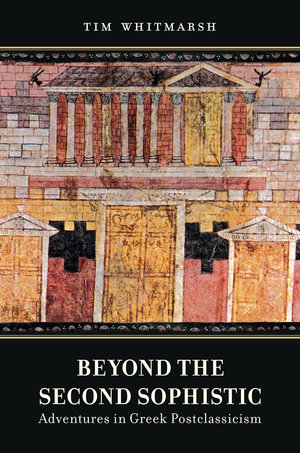This post is part of our #AIASCS2021 blog series. Learn more at our virtual conference exhibit.

As part of our author blog series for the 2021 Archaeological Institute of America & Society for Classical Studies virtual conference, we reached out to author Tim Whitmarsh to discuss his book, Beyond the Second Sophistic – winner of the Charles J. Goodwin Award and now available in paperback.
Tim Whitmarsh has served as the A.G. Leventis Professor of Greek Culture at the University of Cambridge since 2014, after holding professorial posts in Oxford and Exeter. Whitmarsh works on all areas of Greek literature and culture, with a particular emphasis on the culture of Greeks under the Roman Empire. He has also written on religion and atheism in the ancient world, and on identity issues.
What motivated you to write Beyond the Second Sophistic?
I was frustrated by the widespread claim that ‘the second sophistic’ was a defined historical era of Greek literary and cultural production. The assumption had been that Greeks in this particular club were card-carrying, aristocratic super-intellectuals obsessed with their past and little else. I felt that this told us more about the modern scholars’ views of themselves than about the era itself.
So this was my attempt to expand the field of vision, to include popular and non-canonical literature, verse and Jewish material. The title is a bit of joke. It sounds like a play on Freud’s Beyond the Pleasure Principle, but beyond that I was thinking of Aristotle’s Metaphysics, which in Greek is in fact just ‘The One After The Physics’. Having already written a book called The Second Sophistic, I found that the new title tickled me.
Beyond the Second Sophistic was recognized as a notable book when it first published, winning the Charles J. Goodwin Award from the Society for Classical Studies. How do you hope it will be used in courses? What key lessons does it provide to students of Greek literature and culture, among others?
The Greek literature of the Roman Empire is now pretty central to many undergraduate and graduate courses. It’s often presented as something that is funky and exciting, compared to Homer and tragedy, and it is! But also, I think it’s often treated as though it just checks a predictable series of boxes: it’s self-conscious, it’s intellectual, it’s committed to the idea of continuity with the classical past. I hope this book will shake things up, and show the wilder side of this material as well as the culture behind it.
As we start a new year with the virtual Society for Classical Studies conference, what do you see as potential future directions and exciting new developments in Classical Studies?
I think we will see great changes over the next 20 years. The real question is whether Classics will survive as a field distinct from other forms of Ancient World Studies, and if so how. The situation at the moment is embattled. Greeks and Romans were not ‘white’ or ‘European’ in the sense we understand those words today. Only 50% or so of them were ‘male,’ and many fewer were ‘elite.’ Nevertheless, the dominance of the field by white, male, European elites has been pronounced, and the field is more associated, at least in the Anglophone tradition, with social, gendered and racial power than most. This is unsustainable.
Beyond that, I think the post-structuralist, cultural-constructionist mode that has predominated over the last 30 years will probably subside. The study of material culture will play a much greater role in the way that we teach and research, and we will see greater dialogue with the sciences.
What are you working on right now?
I’m finishing off editing a huge collection of translations of Imperial Greek epic poems for the estimable University of California Press. Then next year I’ll write a book about early Christianity. My working hypothesis is that Christianity was the logical fulfilment of, not an antidote to, Romanness.
